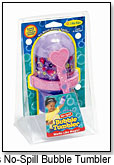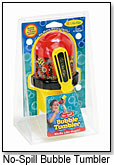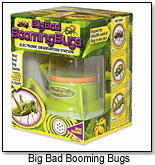| “We're always looking at new ideas and new categories and, with a couple of exceptions, there's not a product or a category we would not go into if we thought we had the right product.” — James Engle, Little Kids |
Success in the toy industry is often determined not by a smash hit, but by the ability to repeat it. James Engle, a Hasbro veteran, established Little Kids in 1989, with 12 years experience in sales and marketing. He started with one item: a juice box container designed to prevent spills.
Released at the right time, it was successful from the first day. He sold 25,000 pieces to small stores, and the second year mass-market chains such as Sears and Toys “R” Us picked it up.
For three to four years he made only juvenile feeding items, such as the Ninja Turtle Juice Box Holder and the No-Spill Ice Cream Cup. Introduced prior to the first movie, Engle said they had the good fortune to license Ninja Turtles before they really took off.
The company released its first toy in Spring 1992: a swimming pool plaything that did poorly due to bad weather and the simultaneous release of Hasbro's Super Soaker.
By May 1993, the drinking cup design had turned into the No-Spill Bubble Tumbler, an award-winning concept that led to the development of an entire line of bubble products, including blowing gadgets and battery-operated devices. His licenses include Blue's Clues, Dora the Explorer, Sponge Bob and Olivia. The popular television show Backyardigins, on Nick Jr., will be released for licensing in Spring 2006.
"Providence, R.I., is an absolutely terrific place," Engle remarked. "It has a great resource base as far as Hasbro alumni — people with a lot of experience in a lot of different categories."
His creative process is staff-generated along with a corps of five to 10 freelance designers. Early in development they test their toys in childcare centers and the local YMCA, making certain the targeted age group can use the product. Adjustments are made and, after receiving samples, usually from Asia, the toy is tested again.
Junk Ball, a brand of sporting goods with an exclusive air resistance design in the balls, made its successful debut in 2005. The mass-market stores stayed away from it the first year, but will carry the product in 2006.
"I wish that the bubble category was big enough to grow infinitely business-wise, but it's not," Engle explained. "We're always looking at new ideas and new categories and, with a couple of exceptions, there's not a product or a category we would not go into if we thought we had the right product."
What does Engle think of big chains like Wal-Mart and Kmart?
"It's very hard to justify doing a product to sell 5,000 or 10,000 pieces," he replied. "So you need somebody big who can give you some pretty good quantities obviously, so that you can at least make some money the first time around."
In January 2006, Little Kids released Big Bad Booming Bugs, an electronic observation station that allows kids to study insects through a magnifying glass and listen to the amplified noises the creatures make. "It's amazing how many different sounds you can pick up with this thing compared to just trying to hear with the naked ear."
Engle has the ability to duplicate success in many areas. Who knows what the future will hold for this innovative manufacturer?
What follows is more information on three of Little Kids' products.
.
This exclusive ball is designed with air baffles and a Program-A-Pitch ring to adjust airflow. When hit by the 32" Sweet Spot Bat, it rises, falls, curves and floats. It is based on air-resistance technology.
— “It’s easy to learn how to throw a curve ball, slider, etc,” using this set, said Rob Slye, owner of Toys Ahoy in Barrington, R.I. His primary customers for the product are 5- to 8-year old boys.
— Kids and their parents were stocking up on all kinds of outdoor ball games, noted Laura Brauer, manager of Cloud Nine Toys in Sudbury, Mass. “It really is the season.”
— Sales for the Junk Ball Bat and Ball Set have been “unbelievable!” Kirk Bozigian, vice president of marketing for Little Kids told TDmonthly. “It’s been incredibly well received in specialty toy shops and sporting goods stores.” It sells well, he said, because “it has this magic dial that gives anybody the opportunity to throw screwballs, curveballs and knuckle balls just by adjusting the airflow through the ball.” The accompanying bat has a 6-inch sweet spot that lets kids hit far. “They really like that!” he said. New for 2006 is a Homerun Challenge Set with a bat, four balls, home plate, pitcher’s mound, six marker cones and four different ways to play.
.
This sand digger has a fun added feature — a built-in water shooter that sprays over 25 feet.
— Robert Slye, owner of ToysAhoy in Barrington, R.I., said, “This is a brand new toy, and sales look pretty promising. I did put them out now, and sold more than I expected, even though it’s March and it’s snowing. It’s different, and people think it’s cool.”
— Parents like the fact that this toy is kid-powered and requires no batteries to make it work.
— Kirk Bozigian, Little Kids vice president of marketing, said, “This toy is a dream come true for preschoolers who love to dig in sand and play with water. Whether at the beach or in the backyard, this toy is great fun!”
.
Kids can make either soft-serve ice cream or sno-cones by affixing different parts in this cool, fun food maker. Kids plunk down hard ice cream into the machine and it is magically whipped into soft ice cream, while ice and flavoring are added to make a fun popsicle-like treat. The kit comes with colorful sprinkles, a Wyler’s flavor packet, spoon, cups and an instruction sheet.
.

